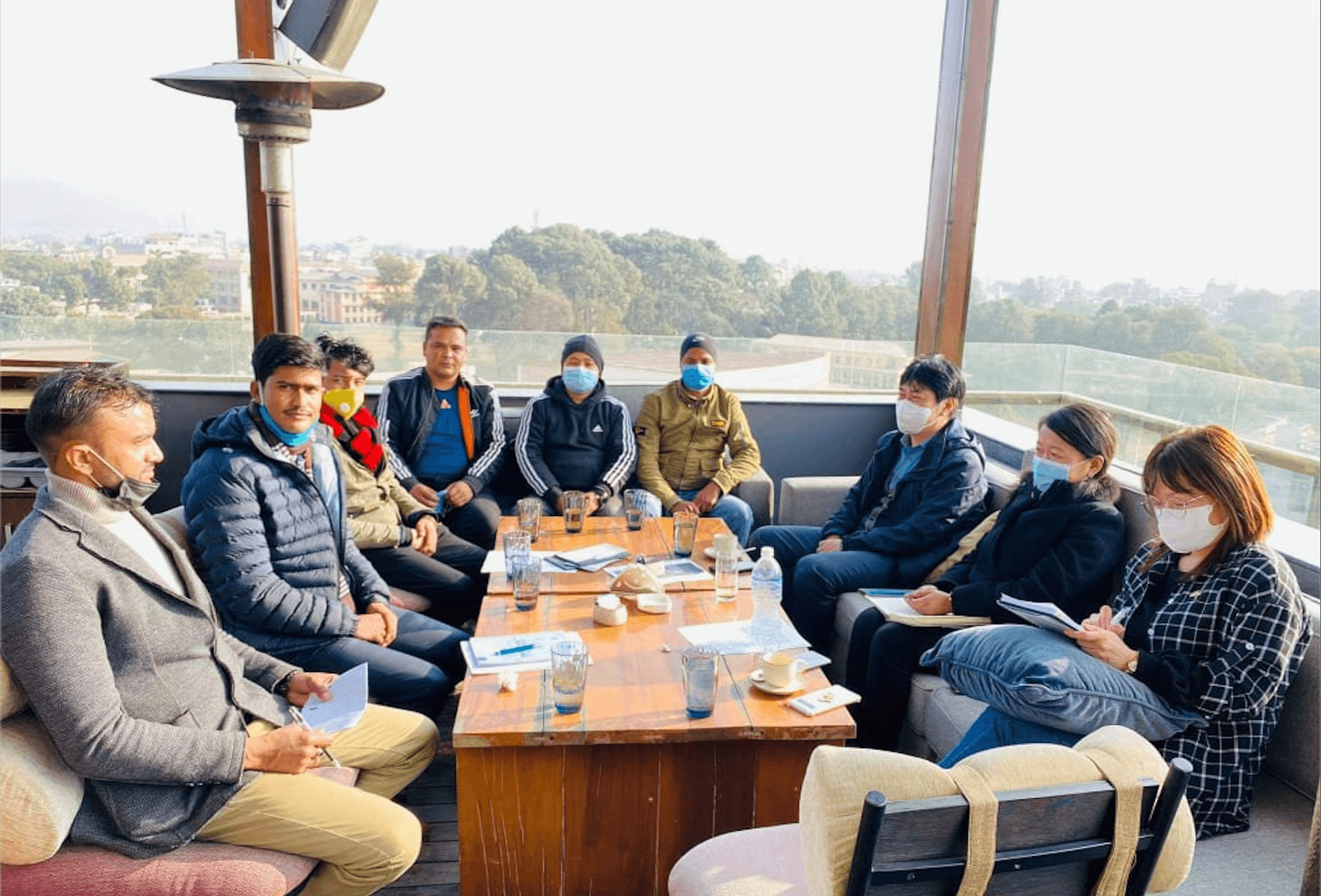Delayed dreams for Korea-bound Nepalis

From his early years, Bhim Oli from Dang knew that he wanted to go abroad to work and earn so that he could support his family. His dream, like that of many Nepali men, was to work hard and make a comfortable living for his family.
On the top of that list for overseas job destinations was Korea. But the preparation costs for South Korea’s Employment Permit Scheme (EPS), language training, food and lodging expenses in Kathmandu were exorbitant.
For the majority of Nepali migrant workers, the Gulf and Malaysia are final destination countries. But for Oli, Qatar was a means to an end. He took up a stint in Qatar as a waiter after completing his Bachelor’s, with a singular purpose of saving up enough so he could return and focus on his preparations for Korean language tests.
The now-familiar acronym EPS usually conjures up images of tens of thousands of Nepalis lining up to register for the mandatory Korean language tests. Since 2008, over 66,000 Nepalis have obtained jobs in South Korea through this program in the agriculture and manufacturing sectors.
The exam itself has been taken by a staggering 585,000 Nepalis, but less than one-tenth of the test-takers eventually get a job in Korea.

After toiling for 18 months in Qatar as a ‘target earner’, Oli returned to Nepal with savings of Rs650,000 to begin his preparation for the Korean EPS. In 2017, he failed his exam. Undeterred, he studied harder for the next one and was one of the 7,996 who passed it, out of 82,264 test-takers in 2018.
“I cannot afford to go to the US. The only option for people like us to try to go to the US is via irregular channels, which costs over 40 lakhs (Rs4 million). Savings in the Middle East or Malaysia are nominal, so I was eyeing Japan and Korea as the best alternatives,” he explains. “In Korea, I can expect to earn one crore (Rs 10 million) in 4 years 10 months, an amount that would be impossible elsewhere.”
But his dreams came crashing down with the onset of the pandemic. Oli was matched with his employer on 3 March, 2020. But unfortunately his employer cancelled his contract in December after he had been waiting for over six months.
The pandemic has thrown the prospect of the new cohorts of aspirant EPS workers in a limbo. The flight restrictions, lockdown and the classification of Nepal by South Korea in the ‘red zone’ for public health reasons has riddled the past year with uncertainties.
“They have other options to bring in workers from East Asian countries where mobility has not been barred, so it is understandable,” Bhim Oli says. “Thankfully, I have been matched with another employer but am worried that I will again lose this opportunity if things don’t change soon.”
His story is not unique.
For Ajay Sodari from Kailali, the lure of South Korea came from the transformation he saw in the living standard in the life of an acquaintance. It seemed within reach for someone like him from a humble background, if he only put in the effort.
Unfortunately, he failed the Korean language test in Kathmandu in 2018. Unable to afford another expensive stay in Kathmandu, he went to Himachal, India for four months to pick apples, earned around Rs80,000 and used that money to survive in the city as he prepared diligently.
“I studied around 18 hours a day for the language test—I had not studied that hard for my SLC, 12th or Bachelors, but I finally managed to pass in 2019,” says Sodari. It was also the year that the government of Korea made an additional skills test mandatory, so it took another few months of preparation. Luckily, he passed. Altogether, 92,000 individuals took the test that year, of which only 12,000 passed.
Sodari was selected to work in an aluminium company. He was thrilled when the cabinet decided in May 2020, to let workers head to South Korea. But the decision has been confined to announcements, as none of the migrants have been able to travel.
Frustrated, and knowing that there were thousands of others in his situation, Sodari started a group called EPS Struggle Committee and staged a protest at the Mandala in Kathmandu. They have held three such protests in the last 13 months, bringing together hundreds of migrants from all over Nepal, but to no avail.
The group has turned to various authorities for help, beginning from labour ministers, to Korean and Nepal government authorities. While they are only met with empty promises and false assurances, they remain persistent in their efforts to get things moving. But the absence of a Nepali ambassador in Seoul for the last two years has adversely affected active diplomacy.

“The issuance of visas has been stopped due to public health concerns. Until last week, Nepal was included in the red zone. But as of last week, they have lifted Nepal from this category and partially started issuing visas in certain categories, like for students,” says Indra Gautam, Director of the EPS Department. “Gradually, they will start issuing visas for EPS workers as well and we are putting in the necessary requests.”
In addition to public health concerns, the Korean side has also expressed concern about a high number of fraudulent cases among test-takers from Nepal. Gautam says that this is currently being worked on, “We are now looking to conduct the exams online and to use biometrics to address the issue of fraud. The preparations are ongoing and once done, we will release information about the dates for the next examinations.”
The men who have been waiting report that they have not just lost face in their families, but also money and suffered overwhelming mental stress. Sodari and other others in waiting say they do not want to be bargaining chips in the negotiations.
“We have invested so much time and money and cannot afford to give up on our dreams. But this has been dragging on for so long, we cannot invest in businesses here, migrate to another country because we will be left neither here nor there as this will eventually work out,” he says.
Gautam says the preparation towards a more transparent testing system affects the dates for the new test-takers. It is not tied to the issuance of visas for outgoing workers which is due to a public health concern.
Since 2008, Nepalis have been taking their chances in this highly competitive program alongside competitors from 15 other countries from South and Southeast Asia. The annual quota has fluctuated, which is attributed to the domestic labour demand in Korea as expressed by employers, diplomatic ties, and the number of workers who overstay their legally allotted time that can penalise the country quota in the subsequent years.

The volume of workers from Nepal and Cambodia, in particular, had become relatively more important over the years. One of the reasons for it was the rising share of these workers in the agriculture sector. The number to be hired from Nepal remains uncertain.
Korea's EPS was given the UN 2011 Public Service Award in the 'Preventing and Combating Corruption in the Public Service' category. An evaluation of this program in the Philippines, one of the 16 EPS partner countries, showed the impact on households of workers -- an increase in monthly expenditure by 30-60% with most of it in health and education. In 2021, about 52,000 workers are expected to be hired from the partner countries.
To be sure, the aspirants are also aware that life in South Korea is not going to be easy as there are aspects that give the employer the upper hand. The difficulties in changing jobs and mismanaged expectations present a whole gamut of other challenges.
Nepalis who pass the EPS exams are educated, whereas the jobs they are offered are what are categorised as ‘dirty, dangerous and demeaning’. Mismatched expectations along with expectations from families can be unbearable for some.
Some migrants succumb to the pressure as has been previously reported in Nepali Times. Of the 143 deaths of Nepalis between 2009 and 2018, for example, 43 were suicide cases which got the attention of policymakers from both countries but little by way of action.

Even after the onset of the pandemic, while aspirants are waiting to be employed in South Korea, the country itself has been receiving flak for certain measures it proposed. Recently, for example, a proposal requiring all foreign workers to get tested has received much criticism, including from the Nepali community in Korea. This proposal was quickly withdrawn in the face of criticism.
It is not just new workers who have been impacted by Covid-19. Of the estimated 10,000 EPS workers stranded, a significant number are committed workers who completed over four years of stay already and were returning.
The Korean government has imposed a ‘4 years 10 months’ cap, a way to ensure that migrant workers under EPS cannot qualify for permanent residency, which is available to foreigners in Korea after they reside legally for five years or longer.

Prakash Shrestha, a member of the EPS Struggle Committee, is a returnee migrant, who wants to go back to Korea to the same employer. “Once we land in Korea, we already dream of returning to Korea as committed workers for another 4 years and ten months, so we can double our savings,” he says.
Prior to moving to Korea, Shrestha worked in a restaurant in Kathmandu but was not able to save much with his monthly earnings of Rs 12,000.
He competed with 64,000 individuals taking the EPS exam in 2014. His starting salary in Korea was Rs101,000. By the time he left in 2019, he was earning close to Rs300,000 a month.
He was supposed to return at the end of February 2020 as a ‘committed worker’ but has been stuck in Nepal. “I was so close to flying out and resuming my job that would have been safe for the next four years. What a difference a few days can make,” adds Shrestha, admitting that the stress has taken a toll on his mental health.
“My employer, luckily, has been patient and is willing to wait for me. Having worked with the same employer for four and a half years, we have developed trust and familiarity with each other so I feel fortunate,” says Shrestha. Like many others, he is now waiting for the announcement to be allowed to fly back to Korea.

writer




